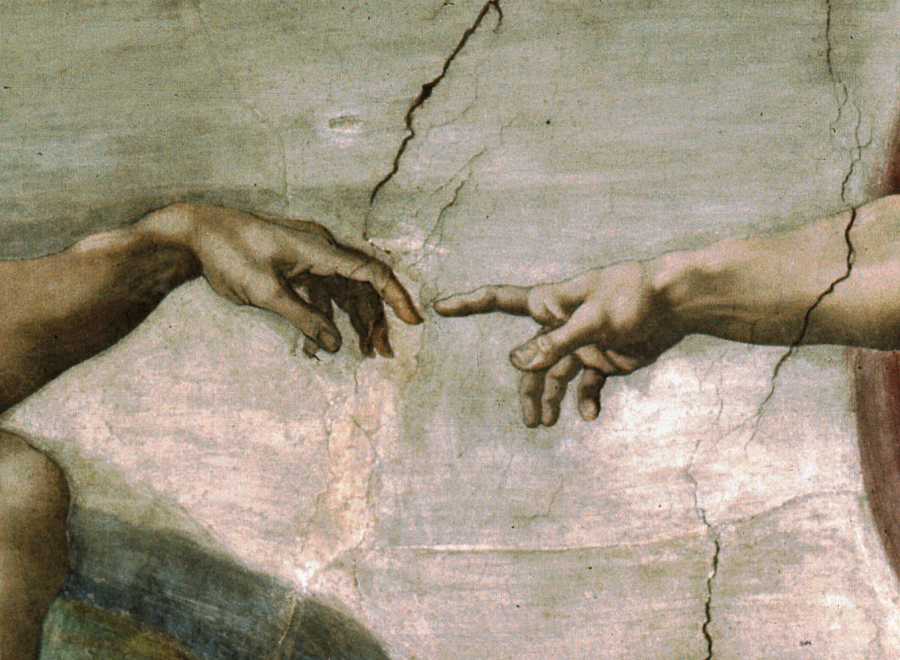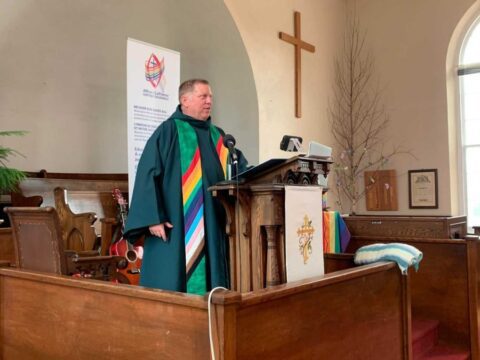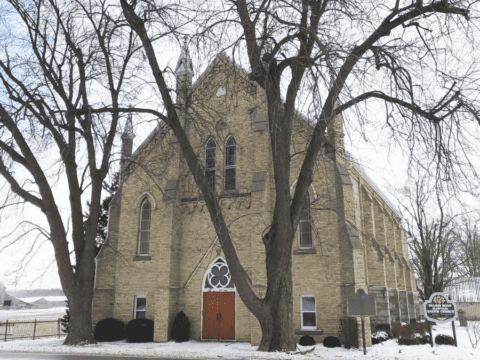The United Church Observer asked you earlier this year about your religious faith. Survey specialists Jane Armstrong Research Associates analyzed your responses and discovered that you fall into four distinct groups of believers: Mainliners, Intuitives, Traditionalists and Nonconformists. Which type are you?
Mainliners: 44 percent
“How’s it going, eh?” asks John Wilkey jovially. A member of Metropolitan United in London, Ont., Wilkey shares his thoughts with a smile that is audible over the phone. Like the largest chunk of our survey respondents, Wilkey, nearing 70, chose the terms of the United Church’s New Creed as the description of God that most closely represents his beliefs: “God has created and is creating. God works in us and others by the Spirit.”
You may unsubscribe from any of our newsletters at any time.
“And I don’t think that excludes evolution,” he says. “He created and is creating, you know? You don’t have to choose either God or science; you can accept both.”
Like roughly 44 percent of the survey respondents, Wilkey holds beliefs that could be described as “mainline.” The expression originally referred to a group of Protestant denominations — including the United Church — that enjoyed considerable power and popularity in the 1950s and ’60s. Although these denominations are now less influential than before, the word “mainline” is still used to describe the way of thinking associated with them in the popular imagination: a Bible-based theology with a concern for the practical implications of the Gospel, especially social justice.
Mainline thought takes its inspiration from a variety of sources, including critical biblical scholarship, which sheds light on the history of the Bible’s text and the cultural contexts in which its books were written, as well the insights of theologians from the Protestant Reformation to the present. Pat Macdonald, 63, of Virden, Man., describes her views this way: “I feel the Bible contains a lot of history and information about the faith and how it developed. But I’m not a literalist.”
Rev. Warren Vollmer, the minister of Lakefield (Ont.) United, thinks similarly and takes his lead from the Swiss theologian Karl Barth. “Barth and others before him had the idea that the Bible is the inspired word of God, but composed and transmitted by people,” he says. “There’s something true and divine behind it all, but it has human hands on it. This is why we recognize—and don’t find it troubling — that there have always been different interpretations of what the Bible means and who Jesus was.”
These differences can cut straight to the heart of the Christian narrative: a little less than half of mainliners believe Jesus’ resurrection was physical, and the rest believe it was spiritual.
Like traditionalists, mainliners generally consider themselves followers of Jesus. But one area where the two groups differ is in the nature of their relationship with him: while traditionalists mainly relate to Jesus as a personal saviour, 61 percent of mainliners see him first and foremost as a role model for living. “Jesus taught us how to treat people,” says Macdonald. “That’s one of the places where I see the United Church leading the way. Opening your arms to everyone like Jesus did is the Christian way.”
Mainliners are also more likely than traditionalists to believe in evolution, and 65 percent of them are open to the idea that all the world’s major religions are equal pathways to God. “If you send 40 kids on a field trip, you’ll get 40 different reports even though it was the same trip,” quips Wilkey.
Most mainliners like to pray. Nearly all think their prayers are received, but only 51 percent believe God responds to their prayers each and every time. They also like to read the Bible: seven in 10 read it at least once a month, and three in 10 had read it the same day they completed the survey. Two-thirds of the respondents in this group rate the Bible as important or very important to their faith.
When it comes to the afterlife, this group is largely unsure of what to expect. Humans have souls and so might animals, according to 70 percent.
A minority of one in three respondents in this group is sure heaven is a real place, out of this world. Only 10 percent believe concretely in hell. Mean- while, half say that even though they are unsure of the existence of heaven, they are going to try to live like it exists. Says Macdonald, “At funerals and events like that, you hope souls do go on in whatever form.”
Intuitives: 35 per cent
When Lorna Kettles hit her 50s, she felt more interested in approaching God than ever before. As a new empty nester, the Ottawa resident had a lot of time for reflection. Soon she set off on the Camino de Santiago, a centuries-old pilgrimage route across northern Spain. Taking her time by foot along dusty roads that reminded her of Saskatchewan, she felt herself on a spiritual journey.
“I have experiences of God in nature,” she says. “It’s a feeling of peace and serenity.”
Feelings and experiences have informed believers’ concepts of God ever since the early days of Christianity. According to the Book of Acts, the Apostle Paul radically changed his religious beliefs after a direct experience of God on the road to Damascus. In the Middle Ages, Christian mystics such as Teresa of Avila and John of the Cross described the pain and joy of feeling united with God.
To the survey segment we’ll call “intuitives,” feeling the presence or reality of God is an important part of their faith. Those in this group, making up 35 percent of respondents, don’t perceive God with sight, hearing or any of the five senses. Rather, they intuit a feeling of God as something either beyond themselves (43 percent) or within themselves (51 percent). All claim to have a relationship with God, though some feel it to be close while others say it is on-again, off-again or ambiguous. Eight in 10 would like to feel God’s presence more often.
In defining God, intuitives are generally comfortable with ambiguity and metaphor: half chose the statement“God is Holy Mystery, beyond complete knowledge” as a good description of their faith, while four in 10 chose “God has created and is creating. God works in us and others by the Spirit.” Intuitives are also open to different ways of imagining God. For example, over 80 percent are comfortable with feminine imagery. At the same time, as several respondents put it, “I don’t picture God; I feel God.”
Intuitives are more likely to be women, over the age of 50 and highly educated, holding a university or graduate degree. They are most commonly found in Quebec and New Brunswick, where they are 56 and 46 percent of the respondents, respectively.
Some members of this group incorporate Jesus into their relationship with God, and others do not. Like the overall majority of respondents, 68 percent of intuitives relate to Jesus as a role model for living. One quarter think of him as the son of God, while most agree he was a prophet (69 percent) or a political rebel (58 percent). “I guess I have trouble interpreting God through Jesus,” admits Kettles. “I prefer to go directly to the source.”
Alice Finnamore, on the other hand, has no trouble seeing Jesus as a representation of God in human form. The 54-year-old New Brunswicker and author of The Glory of Being: A Biblical Journey into Abundance feels that Jesus is her constant companion. “There are times when I feel more aware than usual of his presence,” she says. “But my belief is that he’s always there. I often talk to him, and listen.”
Intuitives are inclined to explore religious possibilities and question established understandings. The Bible is of middling importance to their faith, with the largest segment of them rating it “three” on a scale of importance from one to five. About six in 10 read the Bible at least once a month. The same proportion chose to describe it as a library of Jewish and Christian resources.
For some in this group, the Bible can enhance their experience of God. “The Bible plays a big role in my faith, even though I don’t look at it the way I used to,” says Finnamore. “It has become part of my relationship with Jesus, and I read a portion every day. Some days I read something, and it really speaks to me. Other times it’s like, ‘Oh well, this is just a story today.’”
Prayer is important to the spiritual lives of intuitives, and for some, worship plays a role as well. “I like to take a step back and centre myself,” says Kettles, who enjoys how worship services force her to take time away from her busy schedule. “I come out of it more calm and ready for the rest of the week.”
Intuitives have no strong consensus on how life began, but they accept the reality of climate change and agree that humans are morally responsible to protect the world because of their ability to reason. Most believe humans and animals have souls, and 40 percent believe plants do as well. Nearly all believe our souls live on in some form after death.
Rev. Bruce Sanguin of Canadian Memorial United in Vancouver shares an experiential orientation with the respondents in this group. In fact, he says, people flocked to Jesus “because they could see that he spoke as one with authority; in other words, as one who had direct experience of the Holy.” He feels religion should go beyond telling us about God and actually encourage us to have a direct experience of the Divine. “We are to know God for ourselves,” he says.
“The manual is not thrown out. But neither is it a substitute for immediate experience of the sacred. Rather, tradition, rituals and sacred texts point beyond themselves to the Holy, whom we are meant to be in relationship with.”
“Beliefs,” continues Sanguin, “like personalities and social institutions, come and go. Intellectual assent is less important than direct knowledge.”
Traditionalists: 13 percent
“We believe in and confess the Lord Jesus Christ, the only Mediator between God and man, who, being the Eternal Son of God . . . for our salvation became truly man, being conceived of the Holy Spirit and born of the Virgin Mary . . . He offered Himself a perfect sacrifice on the Cross, satisfied Divine justice, and made propitiation for the sins of the whole world.”
If these words sound familiar, that’s because they are one of the articles of faith hammered out in 1925 by the founders of The United Church of Canada as a basis for union. Ordered ministers must be “in essential agreement” with them, but this requirement allows for interpreting them as metaphysical or spiritual truths rather than literal ones.
To approximately 13 percent of survey respondents, however, it is straightforwardly true that Jesus was born of a virgin, performed miracles, died to save humanity or individuals from sin and rose physically from the dead. “For me, Jesus is really the son of God,” says Dorothy Aimé, 65, of Brandon, Man. “I think that’s what the Christian faith is based on. He was the ultimate sacrificial lamb, like the lambs that were offered for atonement in the Old Testament. If we don’t have that, then what is Christianity?”
Respondents like Aimé — let’s call them “traditionalists” — are spread evenly among age groups and genders. They live all over the country but are represented most heavily in the Atlantic provinces, particularly Newfoundland and Labrador, where 57 percent of respondents fall into this category.
The traditionalists take their main inspiration directly from the Bible, which they see as the word of God, either dictated to human scribes or composed by humans but divinely inspired. The vast majority of them rate the Bible as “very important” to their faith. Nine out of 10 had read it at least once in the past month, and six out of 10 read it on the day they filled out the survey.
Rev. Nick Phillips, minister of Carman United in Sydney Mines, N.S., sees the Bible as a reliable account of the historical facts of Jesus’ life. “If Jesus did not rise from the grave, then why would the disciples go through all the trouble they went through?” he asks. “Why would they risk their lives? It would not have been worth it at all to face persecution and death at every turn.”
When it comes to creation, the group is divided between the 60 percent who believe the story as it is laid out in Genesis and the 40 percent who think that God created the world but that “seven days” is a metaphor. The traditionalists are also divided on the question of whether or not the major religions are all paths to God.
On other questions, there is better consensus. All the traditionalists in the survey believe that human beings have souls. Very few believe that animals, plants or rocks do. Seven in 10 believe heaven and hell are real places — not of this world — where our souls will someday go. Most see humanity as the “pinnacle of Creation” and believe we are descended from Adam and Eve.
One of the most pressing issues for traditionalists, according to Phillips, is bringing Christ back to the centre of the church and our lives. “I think the right after-effects will all flow out of that,” he says. To this end, some United Church people have organized themselves into “renewal” or “reform” groups over the past five decades. These groups include Church Alive, a registered charity whose purpose includes making “a clear, Biblical witness to Jesus Christ crucified, risen and exalted.”
Last April, leaders from the renewal movement shared their experience with a group of younger United Church people who were gathered at a conference in Burlington, Ont., to discuss their faith and inspire one another. Phillips was among them. “Being of this line of orthodox thinking is a tough place to be in our church at times,” he says. “We are starting to organize ourselves and let each other know we are not alone.”
Looking for such like-minded souls, Aimé flirted in past years with evangelical denominations that shared her core beliefs. But she found the churches she attended unwelcoming compared to her United Church home.
“In one of them, a lot of the church members were not accepting of my divorce even though the minister was supportive,” she says. “They would tell me in a judgmental tone of voice that they were praying for my husband to come back to me — ignoring that I had divorced him for a reason.”
Aimé places great value on her beliefs, which she says have helped her to gain a sense of purpose and self-worth, but she doesn’t mind being exposed to other beliefs and opinions. “Whatever anyone says, I know what rings true in my spirit,” she says. “I just hope the United Church will not drift away from the faith it was built on all those years ago.”
Nonconformists: 8 percent
Picture a tree with roots spread out in several different directions, says Rev. Nancy Steeves, the minister of Southminster-Steinhauer United in Edmonton.
“The roots of Christianity reach back 2,000 years,” she says. “And they’re very diverse but we always seem to come to a place where they’re squeezed into the trunk of orthodoxy. What pushes through the ground is constrained and identifiable.” Finally, the trunk gives way to branches that reach into as many different directions as the roots.
Steeves feels herself rooted in the Christian tradition as she reaches for “an emerging understanding” of the sacred. “We see spirituality permeating everything,” she says, referring to those in her congregation who feel they have moved beyond the concept of God as a transcendent, personal entity. “It’s like [the Jesuit priest] Pierre Teilhard de Chardin said: ‘We are not human beings seeking a spiritual experience; we are spiritual beings living a human experience.’”
Like Steeves, eight percent of survey respondents do not conceive of God in personal terms. This includes 12 percent in this category who say they don’t believe in God at all, and 78 percent who say their belief in God depends on what one means by “God” — indicating that they may conceive of God as an abstraction or a sacred but impersonal force. People in this category — let’s call them “nonconformists” — are sometimes labelled non-theists or post-theists. A few could be considered agnostics or even atheists.
Most nonconformists who are willing to offer an opinion on Jesus say he was a reformer or political rebel. “Jesus was a real human who carried a message of reform for the Judaism of his day and wound up inadvertently starting a new religious tradition,” says Thomas Creighton, 80, of Halifax.
Seventy-eight percent agree Jesus was killed because his popularity threatened the authorities of his day, and most believe the story of his resurrection was told to bolster the idea that he was God. “I’ve always known in my heart that the stories we were told were just that: stories,” says Brenda Armstrong, 42, in Leamington, Ont. “I knew the purpose of them was to teach us lessons.”
Nevertheless, many people in this group maintain a sense of spirituality, offering reflections like, “When I picture God, I imagine the unaccountable resonance that I feel when I sing certain old hymns,” or “The open prairie has long been for me an important symbol of the divine, a spaciousness that relativizes.”
“To me, God is a concept that describes the connection of all people to each other and to all living things on the Earth,” says Armstrong, who — like six in 10 of the nonconformists in the survey — believes she feels the presence of the sacred from time to time. “It happens rarely because it takes so many factors to reach the perfect storm,” she says. “But once I felt it at a U2 concert with 20,000 people, all in the moment, experiencing the music. It was amazing.”
Sixty-two percent of nonconformists recorded that they rarely or never pray. But some might do something similar. “I like talking out my hopes and thoughts,” says Creighton. “I don’t know if I’m talking to anyone, but it helps.”
The Bible is seen by 82 percent of nonconformists as a collection of writings by humans trying to advance religious understanding. Most do not rate the Bible as very important to their faith, although some, like Armstrong, see great value in the teachings of Jesus. “He could really think out of the box,” she says. “With his parables, he could see things that other people couldn’t and still can’t.”
Nonconformists take part in the United Church for a variety of reasons. Some were immersed in the Christian tradition earlier in life and grew away from its traditional understandings without rejecting it as a whole. Creighton, for example, grew up singing in church — “I’ve been a choir boy off and on since I was nine” — and he holds great admiration for Christianity’s moral teachings, particularly social justice. “I also love the fellowship it offers,” he says.
There is great concern about climate change among nonconformists. Almost eight in 10 agree that it could lead to human extinction sooner rather than later, and 40 percent consider climate change to be the most pressing issue for United Church people today, “and it is among the most pressing issues for all people,” adds one respondent.
“If you don’t see this life as a dress rehearsal for the next one, and you don’t think this world is going to be replaced when it passes away,” explains Steeves, “then it gives you a heavier sense of responsibility for caring for the world.”
***
This story first appeared in The United Church Observer’s July/August 2011 issue with the title “What you believe.”














